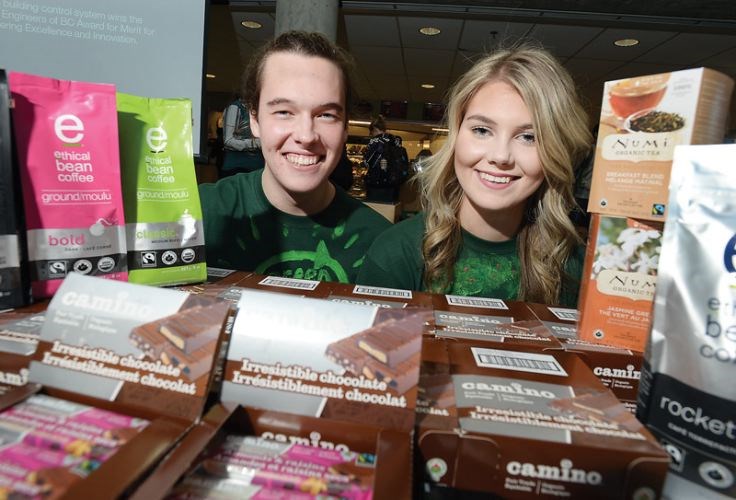Every cup of coffee or tea bought from food services vendors on the UNBC campus now puts fair income in the pockets of the producer.
On Tuesday, UNBC became the ninth university in Canada to be officially designated a Fair Trade campus, meaning the coffee and tea originates at certified plantations and is supplied through transparent wholesaling methods that ensure a fair deal for the farmers producing the stuff, and other standards for working conditions and ethical business are also met.
It took a campus campaign followed by a community awareness effort and the buy-in from the campus food services providers, in order to achieve the Fair Trade designation administrated by Fair Trade Canada.
Much of that ground work was done by Matthew Ewen, a student in biochemistry and molecular biology, and Torrye Mackenzie, a biomedical and First Nations studies student. They recently attended a Fair Trade awareness conference in Montreal and came back with the motivation and know-how to have it happen.
"We have heard of schools taking a couple of years to achieve Fair Trade designation so to have it happen just since September is really exciting, it happened quickly here," said Ewen.
It helps that at a small university like UNBC there are compact channels of communication and a compact group of food services outlets: Chartwells, the Ancillary Services department, the Thirsty Moose Pub and Degrees Coffee.
"It is charity that is not charity," said Mackenzie, explaining the goal of the Fair Trade movement. "We are giving these producers an opportunity to have a sustainable income for themselves and their families, and that makes for more sustainable communities at the source of the production."
Brands that do not have the Fair Trade certification may or may not be paying a fair price for the product being sold in the developed world for retail prices that benefit only the corporations involved.
Now that coffee and tea is covered, as well as the sale of some Fair Trade chocolate at campus stores, the students would like to set new goals.
"Cotton is also covered by Fair Trade Canada, so clothing items can be certified Fair Trade," said Mackenzie. Fair Trade Canada also has designations for a range of products like wine, gold, spices, even sports equipment manufactured in developing countries.
"We could start with one feature UNBC T-shirt made with the Fair Trade stamp, and expand to all kinds of UNBC clothing," Ewen said.
The Fair Trade designation coincided with Green Day activities at UNBC, which calls itself Canada's Green University. UNBC president Daniel Weeks listed many of the year's key components backing up that claim, like ultra efficient energy infrastructure, construction of a campus greenhouse and aboriginal pit house, a UNBC-community-aboriginal partnership to enhance the Ancient Forest trail system, and a food recovery system that has now diverted half a tonne of UNBC kitchen excess to the St. Vincent de Paul food bank.
"The Fair Trade Campus designation is the latest example of UNBC's ongoing commitment to sustainability," said Weeks. "Ensuring that products consumed at UNBC are ethically sourced and socially responsible is something the entire university community can take pride in achieving and we will celebrate this designation during the upcoming Canada Winter Games."



